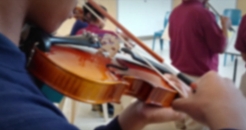 Making music, changing lives: Youth orchestras help at-risk children
Making music, changing lives: Youth orchestras help at-risk children
From an article by Elizabeth Thompson, North Carolina Health News
Bethany Thompson didn’t know what to expect when she decided to start a youth string orchestra at Chatham Youth Development Center, which houses children in the juvenile justice system.
She was inspired by her uncle, who was incarcerated and had confided in her how isolating being in prison could be. She used to perform with her cello in a juvenile detention centre when she was younger, but she wanted to get incarcerated people involved in the community of music makers.
That’s how Chatham Strings was born.
For about two years, Chatham Strings, an orchestra made up of donated violins, cellos and one viola helped incarcerated children explore creativity, teamwork and accomplishment. COVID-19 stalled the programme in 2020, and then Thompson graduated from her doctorate program and moved to California.
“There’s potential benefits to music involvement,” Thompson said, “like recovering from traumatic experiences in life, fostering a positive experience with learning and new experiences, education, and also developing interpersonal skills that are so essential to life. They were discouraged from learning new things, that was part of their past. When they were given the opportunity to try something new, and they started enjoying it, and noticing a bit of success, they started saying, ‘Oh, why am I limiting myself?’”
Chatham Strings was one look into the transformational powers of music, which studies suggest improve cognitive skills, health and well-being.
Just 40 miles away from Chatham Youth Development Center, Kidznotes has boasted that participants in its out-of-school music programme for students in lower-income areas have higher school attendance rates and improved academic performance. The program is based on the El Sistema model originally launched in Venezuela for children in impoverished neighbourhoods to learn music.
"More important than test scores, though, is the joy of music," said Shana Tucker, Kidznotes’ executive director.
According to Professor Emeritus Donald Hodges, there is something unique, but nothing magical about music. "Playing music can activate different parts of the brain, for example, when you play a violin, your right hand, which controls the bow, controls the rhythm, while your left hand, which presses the notes on the strings, controls the melody. After doing that activity over and over again, it creates a permanent imprint on the brain and that kind of coordination can be found in many activities."
Playing music and being part of an ensemble involves coordination and teamwork, but it also requires expression - as an individual and as a group.
The dynamics of how an orchestra works is very similar to how you create an intentional community outside of the programme.
Read the full article here.
Could this be a youthwork programme? Could this be something that uses the gifting of Church musicians?
Retweet about this article:
From an article by Elizabeth Thompson, North Carol, 16/03/2022